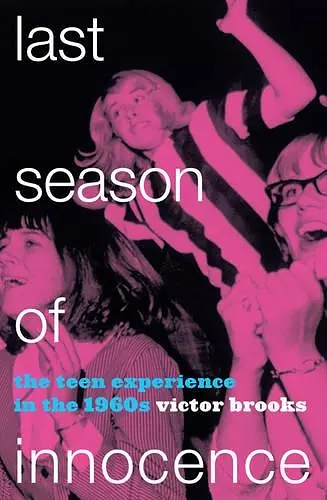Last Season of Innocence
The Teen Experience in the 1960s
Format:Paperback
Publisher:Bloomsbury Publishing PLC
Published:17th Aug '15
Currently unavailable, our supplier has indicated it should be available around 15th January 2026

Last Season of Innocence discusses the lives of the preteens and teenagers who were in junior high school, high school, and the first year of college in the 1960s. These are the young people who read Seventeen and Mad, watched more television than their older siblings, and tended to listen to 45 rpm singles or "mono" LPs rather than the more sophisticated stereo albums of their older siblings. Substantial numbers of these teens could and did join political protests, but they also engaged in a more personal daily struggle with school dress codes and parental intrusion on social life. In a nation where a third of the population was under nineteen, they were hardly invisible, but their experience seems to have been marginalized by the twenty-somethings who largely redefined the meaning of the youth culture and took center stage in doing so. Brooks offers a unique account of the much-chronicled 1960s by examining the experiences of these preteens and teenagers.
Brooks (history, Villanova Univ.; Boomers: The Cold War Generation Grows Up) here reviews the academic, social, and cultural experiences of American preteens and teenagers from 1960 to 1969. He organizes his book both chronologically and thematically to provide a narrative of the changes in teenage culture over the course of the decade. He ably compares the generally accepted historical narrative that focuses on political protest and psychedelic music with data such as music sales and radio charts, popular magazine features, and television ratings to show that, in fact, the experience of teenagers varied wildly throughout these years. A particular strength of the work is the author’s focus on the early 1960s, as this period has had far less scholarly attention than the end of the decade. VERDICT There is a general note on sources, but no direct citations via endnotes, which may disappoint serious readers. However, while numerous other works have examined the cultural history of the 1960s, Brooks’s book is one of the few to focus solely on the American teenager. As such, highly recommended for followers of modern American cultural history. * Library Journal *
In Last Season of Innocence, Victor Brooks mines the collective memory of this generation as it traveled through the Sixties. From music to movies to television to politics to culture and lifestyle, this book conjures up stories, images, and references that will be immediately recognizable to anyone who lived through that breathtakingly vivid and transformational era. -- Leonard Steinhorn, author, The Greater Generation: In Defense of the Baby Boom Legacy
Now that the baby boomer generation has reached retirement age, a number of new works provide a reexamination of their teenage years. Many of these new books concentrate on the dramatic events that shaped the sixties. Brooks (Villanova Univ.), however, analyzes post-WW II teenagers as they experienced adolescence not as political activists or as the small number who were outliers, but from the perspectives of average middle-class children. He divides his work into two periods, 1959-64 and 1964-69, arguing that a substantial change occurred in the US in that ten-year period. One of those changes was that by the late 1960s, US culture and the economy revolved around young Americans, who accounted for 40 percent of the country's population. In 12 well-written chapters, Brooks focuses upon family life, high school, college, movies, and music. He concludes that the postwar teenagers received a better education than their parents, were the first generation exposed daily to an unpopular war, produced a more casual public culture than previously existed, and altered popular cultural media, especially music, more than any previous group of young people. Summing Up: Recommended. * Choice Reviews *
ISBN: 9781442255951
Dimensions: 225mm x 151mm x 17mm
Weight: 331g
216 pages